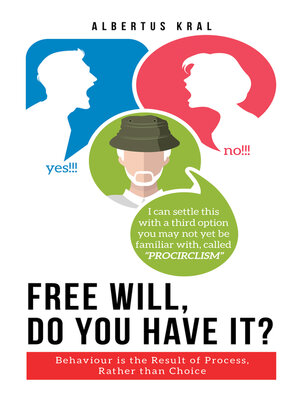Free Will, Do You Have It?
ebook ∣ Behaviour Is the Result of Process, Rather than Choice
By Albertus Kral

Sign up to save your library
With an OverDrive account, you can save your favorite libraries for at-a-glance information about availability. Find out more about OverDrive accounts.
Find this title in Libby, the library reading app by OverDrive.



Search for a digital library with this title
Title found at these libraries:
| Library Name | Distance |
|---|---|
| Loading... |
This second edition is fine-tuned to provide a smooth reading experience.
The "free will" debate has never, conclusively, been solved, otherwise we would not have this conversation. There is basically one group that says, "We have free will", while the other group of people says, "We do not have free will". The great majority of people do believe we have free will.
In this book, I present a third option, one that has never been presented before. My theory, called "Procirclism", goes far beyond the free will issue. This theory can be applied to all human behaviour, always and anywhere. It provides us with an understanding we may have never thought about. Every chapter and subject discussed in the book is an integral part of the theory, without which the theory can not exist. I realize I have gone far away from the conventional thinking patterns but it was the only option to present a completely new approach in which the answer is embedded.
Behaviour is the result of process rather than choice. This is a fundamental concept and worth pondering for a moment because the implications are far-reaching. How would we respond if we received a phone call from our friend who is in Russia? He or she went to Russia without ever before having traveled outside of the country, and never mentioned anything about any plans to go to Russia. We just talked with our friend two days ago and nothing was mentioned about traveling. "Why?" is most likely to be among our first questions. Now I ask why we just don't believe that our friend got up one day and decided, without any reason or motive, to travel to Russia where he or she has no family or friends. Choice? Process?
During murder trials, the prosecution desperately tries to find a motive, because it is difficult to understand that someone would commit murder without a motive or reason; insanity only provides half of the answer. If anyone could commit murder without motive, reason, or any other influential factor then we would have to try hard, every day, not to murder someone. Yes, sounds ridiculous, doesn't it?
My concept of Procirclism is not a collection of previous thoughts presented in a different manner, but it is a novel approach and concept, addressing questions that have occupied some inquiring minds for centuries.







